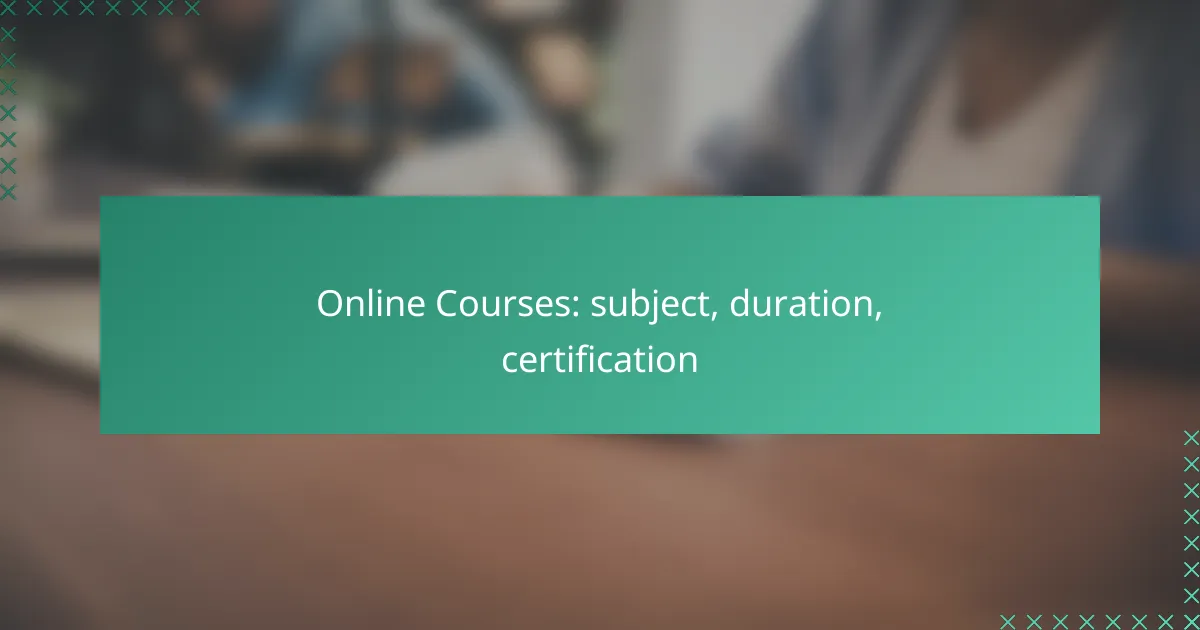Online courses provide a diverse array of subjects, durations, and certifications tailored to meet various professional needs. With platforms like Coursera, edX, and FutureLearn, learners can access high-quality content that enhances their skills and career opportunities. Course durations typically range from a few weeks to several months, depending on the depth of the material covered. Additionally, many courses offer certifications from reputable institutions, adding value to your resume and improving job prospects.

What are the best online courses in the UK?
The best online courses in the UK offer a range of subjects, durations, and certifications that cater to various professional needs. Popular platforms like Coursera, edX, and FutureLearn provide high-quality content that can enhance your skills and career prospects.
Coursera: Business Analytics
Coursera’s Business Analytics course is designed for individuals looking to leverage data to make informed business decisions. Typically, this course lasts around four to six months, depending on your pace, and covers essential topics such as data visualization, statistical analysis, and predictive modeling.
Upon completion, participants receive a certificate that can enhance their CV and demonstrate their analytical skills to potential employers. It’s advisable to allocate a few hours each week to keep up with the coursework and assignments.
edX: Data Science MicroMasters
The Data Science MicroMasters on edX provides a comprehensive overview of data science principles and techniques. This program usually spans several months and includes courses on probability, statistics, and machine learning, making it suitable for those aiming for a career in data science.
Participants can earn a verified MicroMasters certificate, which is recognized by many institutions and can be a stepping stone towards a full master’s degree. Engaging with the community forums can enhance your learning experience and provide networking opportunities.
FutureLearn: Digital Marketing
FutureLearn’s Digital Marketing course focuses on the latest trends and strategies in online marketing. This course typically runs for about six weeks and covers topics such as SEO, social media marketing, and content strategy.
Upon completion, learners receive a certificate that can be shared on professional networks. To maximize your learning, consider applying the concepts in real-world scenarios or projects, which can deepen your understanding and showcase your skills to employers.

How long do online courses typically last?
Online courses generally vary in duration, ranging from a few weeks to several months. The length often depends on the course type and content depth, with shorter courses focusing on specific skills and longer ones covering broader topics.
Short courses: 4-6 weeks
Short courses typically last between 4 to 6 weeks and are designed to provide focused knowledge on specific subjects. These courses often require a commitment of a few hours per week, making them suitable for learners with busy schedules.
Examples of short courses include introductory classes in coding, graphic design, or digital marketing. They are ideal for those looking to quickly acquire new skills or enhance existing ones without a long-term commitment.
Professional certificates: 3-6 months
Professional certificates usually take 3 to 6 months to complete and are more comprehensive than short courses. These programs often involve a deeper dive into a subject, requiring a greater time investment of several hours each week.
Common examples include certifications in project management, data analysis, or web development. These courses are beneficial for individuals seeking to advance their careers or gain qualifications recognized by employers.

What certifications can you earn from online courses?
Online courses offer a variety of certifications that can enhance your skills and improve your job prospects. These certifications often come from reputable institutions and can be a valuable addition to your resume.
Google Data Analytics Certificate
The Google Data Analytics Certificate is designed to equip learners with essential data analysis skills. It covers topics such as data cleaning, visualization, and analysis using tools like spreadsheets and SQL.
This program typically takes about six months to complete, assuming a commitment of around 10 hours per week. Upon completion, you receive a certificate that is recognized by various employers in the tech industry.
To succeed, focus on hands-on projects and practical applications of data analysis concepts. Avoid common pitfalls like neglecting to practice with real datasets, as this can limit your understanding and application of the material.
Harvard’s CS50 Certificate
Harvard’s CS50 Certificate is an introductory course in computer science that covers programming languages, algorithms, and software development fundamentals. It is well-regarded for its rigorous curriculum and engaging teaching style.
This course usually spans around 12 weeks, with an estimated workload of 10-20 hours per week. Completing the course earns you a certificate that is highly respected in both academic and professional circles.
To maximize your learning, actively participate in coding exercises and collaborate with peers. Avoid rushing through the material; take the time to understand each concept thoroughly to build a solid foundation in computer science.

What factors should you consider when choosing an online course?
When selecting an online course, consider the relevance of the course content, the qualifications of the instructor, and the overall structure of the program. These factors can significantly influence your learning experience and the value you gain from the course.
Course content relevance
Assessing the relevance of course content is crucial for ensuring that the material aligns with your learning goals. Look for courses that cover topics directly applicable to your field or interests, as this will enhance your skills and knowledge effectively.
Check the course syllabus or outline to see if it includes current trends and practices in the subject area. For example, if you’re interested in digital marketing, ensure the course addresses recent developments in social media strategies or SEO techniques.
Instructor qualifications
The qualifications of the instructor can greatly impact the quality of the course. Research the instructor’s background, including their education, professional experience, and any relevant certifications. A well-qualified instructor can provide valuable insights and practical examples from their own experiences.
Consider looking for instructors who have a proven track record in teaching online courses. Reviews and ratings from previous students can also give you a sense of the instructor’s effectiveness and engagement level. Aim for instructors who are not only knowledgeable but also skilled at conveying complex information clearly.

How do online courses compare to traditional education?
Online courses offer a more flexible and often more affordable alternative to traditional education. They allow learners to access materials and complete assignments at their own pace, which can be particularly beneficial for those balancing work or family commitments.
Flexibility in scheduling
One of the main advantages of online courses is their flexibility in scheduling. Students can choose when to study, allowing them to fit learning around their personal and professional lives. This is especially useful for those who may have irregular work hours or family obligations.
Many online programs offer asynchronous learning, meaning students can access lectures and materials at any time. This contrasts with traditional education, where classes are held at fixed times, requiring students to adhere to a strict schedule.
Cost-effectiveness
Online courses are generally more cost-effective than traditional education. Tuition fees for online programs can be significantly lower, often ranging from hundreds to a few thousand dollars, compared to the tens of thousands typically associated with in-person degrees.
Additionally, online learners save on commuting and housing costs, as they can study from anywhere. However, it’s important to consider potential hidden costs, such as technology fees or required materials, which can vary by program.

What are the emerging trends in online learning?
Emerging trends in online learning include the increasing integration of artificial intelligence in course design and the rise of micro-credentials. These trends reflect a shift towards more personalized and flexible educational experiences that cater to diverse learner needs.
Increased use of AI in course design
The use of artificial intelligence in online course design is transforming how educational content is created and delivered. AI can analyze learner data to tailor courses, recommend resources, and even provide real-time feedback, enhancing the overall learning experience.
For instance, platforms may utilize AI algorithms to assess a student’s progress and suggest personalized learning paths. This approach not only improves engagement but also helps learners focus on areas where they need the most support.
Growth of micro-credentials
Micro-credentials are becoming increasingly popular as a way for learners to gain specific skills in a shorter time frame. These bite-sized qualifications often focus on practical skills relevant to the job market, making them appealing to both learners and employers.
Typically, micro-credentials can be earned through short courses or modules that take a few weeks to complete. They provide a flexible option for individuals looking to enhance their resumes without committing to lengthy degree programs.
